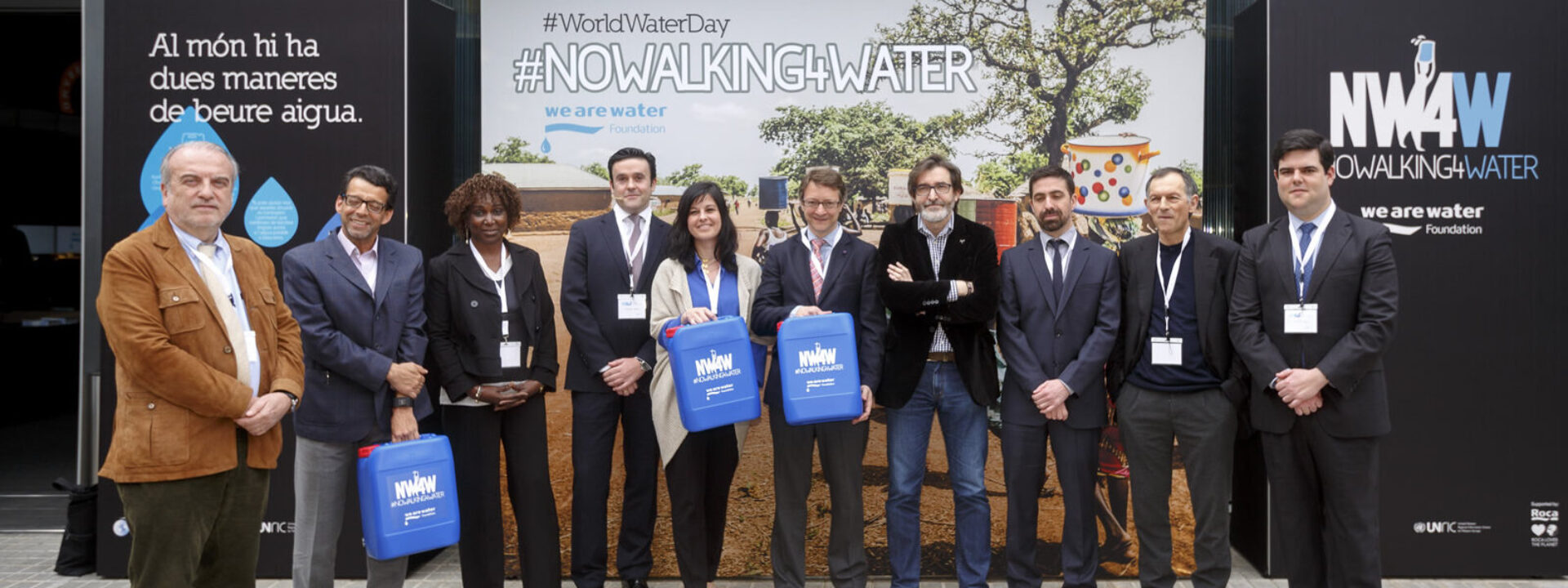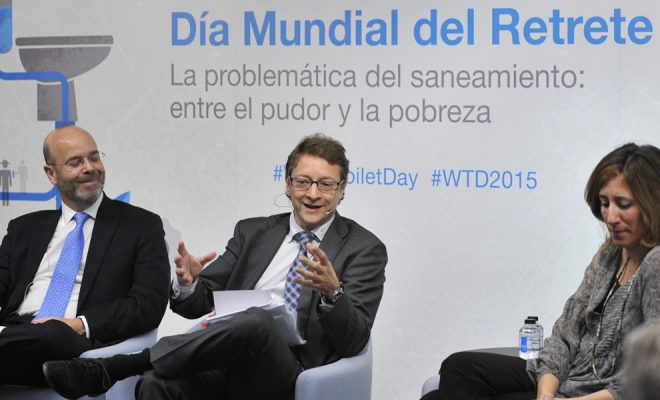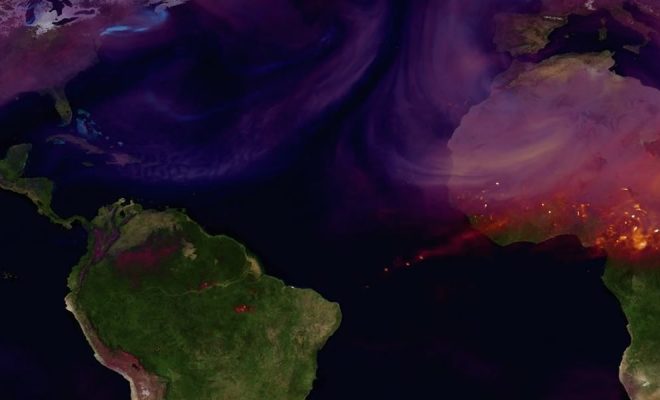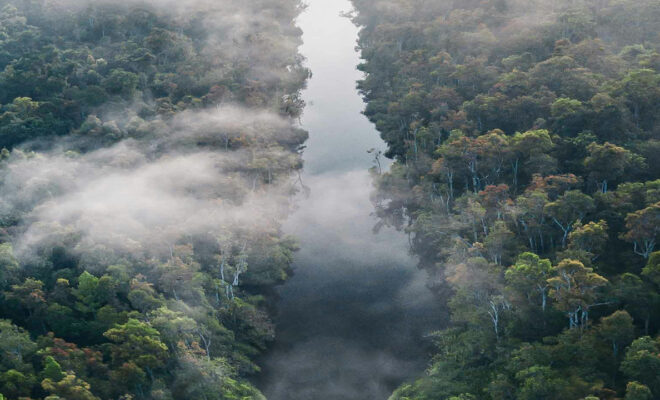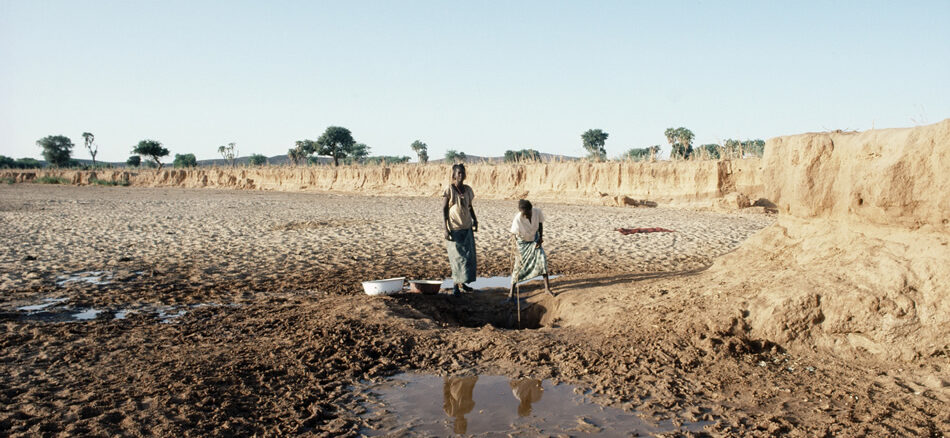
© UN_Jeffrey_Foxx
The average weight (65 kg) of an individual on Earth contains 50 litres of water; this is a scientific certainty. Those of us who live in developed countries also have the certainty of sanitation: we are able to double or even triple that quantity every day simply by opening a tap. But the forecasts of economic development and climate change alert us that this certainty is in danger: we continue polluting the water, we manage it poorly and in all likelihood, in large areas such as the Mediterranean, we will have less. And it is not just a matter of opening a tap: all our economic system relies on our most precious resource.
This worries us but, how should this affect those who do not even have a tap and are fighting to obtain a near access and decent sanitation? In several areas around the globe, such as sub-Saharan Africa, South Africa, Central America, India and Bangladesh hundreds of millions of people suffer a persistent water shortage. These regions, already with an obvious hydric stress, have been defined by climatologists as “extremely vulnerable” to climate change: they will simply have less rain and when they have it, it might be too strong.
There are enough reasons for action. The slogan of the World Water Day this year, “Water and jobs”, is a wake-up call on a reality that not only affects those with no water but also all of us who depend on it from an economic point of view.
Nine experts in an intense day
With the aim of commemorating World Water Day, on the 15th March the We Are Water Foundation gathered nine experts at the Roca Barcelona Gallery for the Masterclass Water and jobs. The power to transform our lives. The aim was to debate on the water economy in three content segments that would cover the maximum number of approaches: The first one was Misuse of water: water and its sustainable use, with Carlos Mario Gómez, professor of Foundations of Economic Analysis at the University of Alcalá, Damià Barceló, director of the Catalan Institute for Water Research (ICRA), and Arturo Larena, director of Futuro / EFEverde; the second one, Women and children, towards the equality of opportunities, with Alejandro Maceira, founder and director of iAgua, Regina Gallego, international independent consultant, and Bombo N’Dir, president of the Association of Sub-Saharan Immigrant Women; and the third one, Water, an industry of the future?, with Víctor Viñuales, cofounder and director of ECODES, José Luis Martín Bordes, head of the GWOPA / ONU HABITAT programme, and Xavier Torras, director of the We Are Water Foundation.
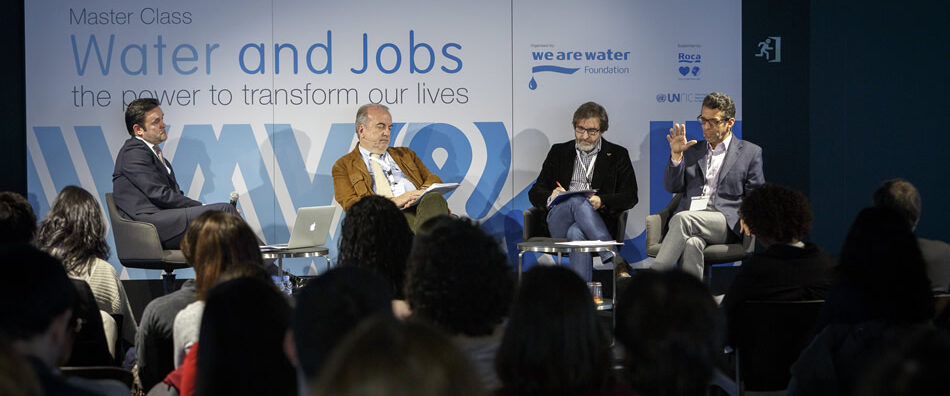
It was an intense day focused primarily on the young students from all Barcelona universities that filled the hall. During the meeting, the students, future water managers and researchers, talked to the speakers about the existing relationship between water and the world or work and the problems related to the great challenge of the water resources around the world. The debate was too short, yet intense and enlightening with regard to the foundations of the situation in connection with water.
A vital and vulnerable resource
The first segment, Misuse of water: water and its sustainable use, moderated by Alejandro Maceira, fully covered the problem of the socioeconomic reality of water, a very vulnerable economic driver that is diminishing in many areas around the world and something many of us here are not fully aware of.
First, Carlos Mario Gómez summarised the close link of water and economy, highlighting aspects that sometimes go unnoticed even though they seem obvious, such as water being the basis for any community to leave poverty behind and start the economic development, as it establishes the balance between people, nature and economy, presenting a “challenge of an immense scale” for all of us.
Gómez emphasised the importance of the coordination of goals, considering that “not only do we need to aim for the sustainable use of water, we need to make the entire economic development sustainable”, which implies a high degree of coordination in a situation altered by global warming. For this professor of the University of Alcalá, it is essential to assimilate the technological innovations at the right pace and to recover the regenerating role of the environment: “We cannot leave the quality of water in the hands of water treatment plans. We need to recover the environment, as it has the capacity to regenerate itself and to improve the water quality in a natural way”.
It is a fact that in large areas around the planet, such as the Mediterranean basin, water resources are decreasing and they are extremely vulnerable, due to the lack of a good management and the effects of pollution. Damià Barceló explained the cost implied by water pollution in our current supply system: “We need to take into account that any chemical agent we use ends up in the water treatment plant”. This expert in water chemistry mentioned the enormous amount of polluting products we use daily and he warned that economic growth leads to their increase.
Barceló stressed the important role of our awareness towards the care of water: “We as individuals should pollute less, we live in a privileged environment and there is a lot each one of us can do. Between all of us we need to avoid this increase in polluting agents linked to economic growth, mainly in a world that increases its population by 80 million every year – equivalent to the population of Germany – , a population that needs water and food”. The director of ICRA stressed the cost of the decontamination of water and the critical situation of Spain, a country immersed in a semiarid situation: “We need to develop technology even more, as each area will require different solutions and these need to be cheap. We need to take into account that the Mediterranean will end up surviving thanks to the desalinisation plants”.
Arturo Larena, on the other hand, explained the role of environmental journalism whose aim is to inform us and raise our awareness of the importance of achieving the sustainability of the planet, a goal that requires social sustainability beforehand: “We have advanced greatly thanks to the information supplied by the environmental journalist that, at a steady pace, starts raising awareness. We as journalists need to inform of the fragility of our environment, improve its knowledge and do this by telling stories that interest and educate”.
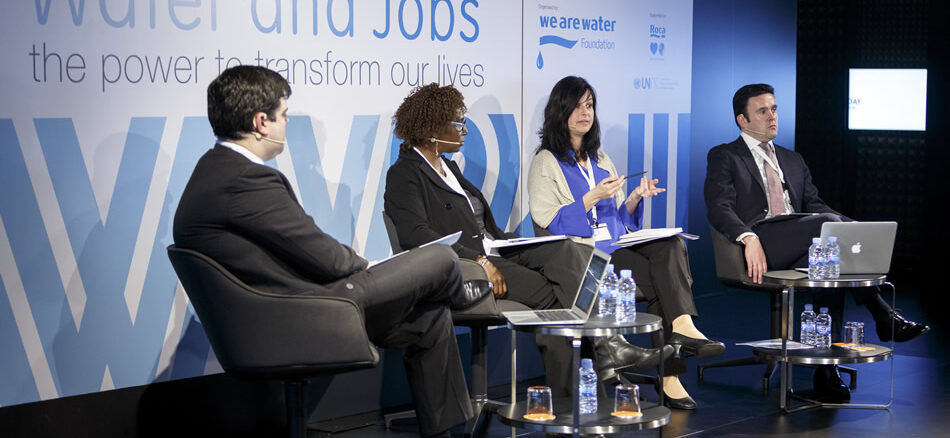
The director and founder of the project EFEverde placed great importance on being well informed, as this is the foundation of the pressure we can exert: “A well informed society, which knows about the fragility of our environment and the processes that affect it is able to demand more from politicians. This demand is a responsibility we all have”.
Larena praised the fact that the corporate world has finally accepted its social responsibility and the benefit this implies for the improvement of communication. “The companies provide very important information they return to society. The companies create wealth, jobs and health solutions. We need to take into account that 2.4 billion people do not have access to a toilet and nearly 1 billion defecate in the open”.
Women and children queuing up for water
The second segment, moderated by David Escobar from iAgua, focused on one of the most difficult problems we have in our world these days: the lack of access to water and decent sanitation that affects millions of people and whose main victims are women and children. The campaign #NoWalking4Water, launched by the Foundation, was the ideal framework for the debate.
It was started by Alejandro Maceira who went over and summarised the Millennium Development Goals (MDGs) and the Sustainable Development Goals (SDGs). These goals create the reference context in regard to the rights and obligations we have as inhabitants of the planet towards the problem of women and children. Maceira stressed “the importance of the fact that in the SDGs the right to water and sanitation has been set apart and highlighted; sanitation used to be the “poor relative” and now it has the importance it deserves”.
The director of the specialist publication iAgua summarised and explained the concepts of accessibility, acceptability and affordability of water, and remembered a fundamental aspect of the successful management of that precious resource: “The efficient governance is fundamental for the solutions to the access to water to be sustainable. We cannot provide a service without the proper management”.
Maceira alerted us to the avalanche of statistical data managed nowadays on water which may distort the validity of the information: “Figures disguise many aspects, they need to be analysed carefully and it is the role of experts to discover the relevant matters”.
Regina Gallego also alerted to the statistics as indicators as they are not always reliable, considering that they refer to very changeable situations and they do not include the “invisible” communities that are always the most affected: “Sometimes these are difficult data to be estimated. A registered water source might only work three hours every day and often there are waiting hours of women and children that are not recorded. Part of the population is not included in the census, it is invisible and marginal; and in these communities women are an even more marginalized subculture”.
The international consultant carried out a brief and impressive description of the meaning of the lack of access to water in the poorest areas of the world: “To do the laundry in polluted rivers is hard, but to give birth in a hospital with no water is even worse”. And she explained that women are usually the protagonists in all water projects, and they do it “from two perspectives: as actors and managers, and also as victims”.
Facing the challenge of having to convince governments of their implication in the solution of problems, Gallego advocated the collection of convincing data by the NGOs and the use of the SDGs as a political pressure tool. As for the most reluctant cases, such as the countries immersed in social or armed conflicts, she declared that the solution can be found in community work: “In these countries there are community structures that are already working, and external agents that can support these communities to determine which infrastructures are sustainable and which are needed”.
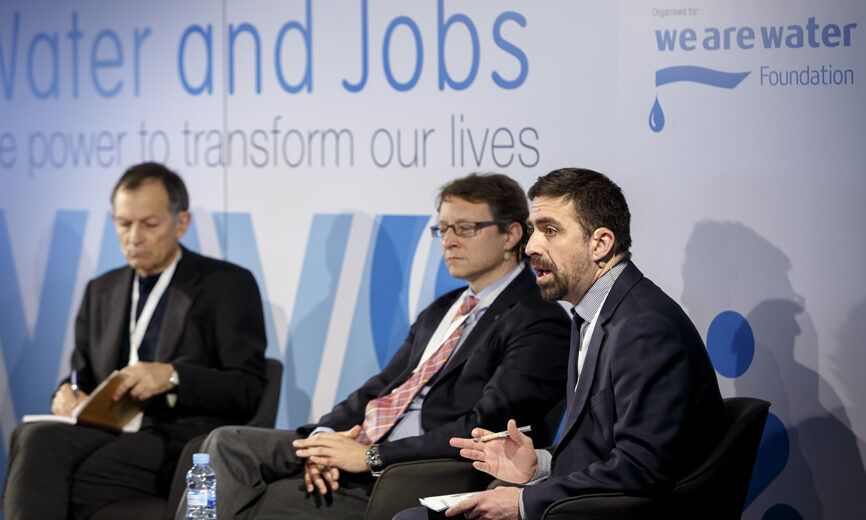
On the other hand Bombo N’Dir supported the description of the role of women as managers and victims of the lack of water problems based on her experience in her country of origin, Senegal, and extended it to the entire sub-Saharan Africa: “Women have always managed water, they have been the traditional centre. Now committees for water management have been created, but women do not have time to manage everything and they need to help their daughters in the collection of water. They cannot empower themselves and their daughters do not attend school”.
In the same way as Gallego, N’Dir declared that the waiting time at the source generates many conflicts and the importance of education for women to be able to manage and demand their rights: “Many times there is a lack of information on the quality of water. Training is very important when there is a lack of access or poverty and this can be achieved with education”.
What is the future of the water economy?
The third debate was started by José Luis Martin Bordes who explained the difference between the MDGs that governed the international agenda until 2015 and the post 2015 era until 2030 and, as well as Maceira in the previous debate, he stressed the new role of water and the inclusion of sanitation in the SDGs.
The head of the GWOPA / ONU HABITAT programme highlighted that the new United Nations agenda is much more inclusive and it does not contemplate water only from the point of view of the access: “The new water and sanitation goal in this new 2030 agenda is much broader and it acknowledges that water is the heart of sustainable development. It also specifies that there should be an equitable access to suitable sanitation and hygiene services. This is something new in regard to the previous agenda”.
Martín Bordes emphasised that in the new agenda “it is acknowledged that this sustainable development goals cannot be reached without international cooperation” and he stressed the importance of this philosophy which is essential to attain any goal: “With the SDGs we are calling to an improvement of international cooperation, both on the North-South level, but also on the South-South level, that is, on a regional level: we wish to drive the exchange of good experiences and good practices based on local knowledge”.
Víctor Viñuales addressed the essential role played by companies in the attainment of the SDGs: “It is essential that companies change their position and reconsider their own DNA and cooperate with NGOs so that these do not need to work alone. Companies are vital to make the most of the investment in actions and to avoid collateral damages”. And he gave different examples of corporate initiatives with this approach, such as B Corporation, Rainwater and AguaClara in the United States. All of them are based on the certainty that it is necessary to act and when doing it there are benefits for everybody: “All companies manage water and they need to act forced by reputation instead of by law”.
The director of ECODES praised the activities and name of the Foundation and he posed a challenge to the young students that filled the hall: “We Are Water, and this takes us very far, towards an uncertain future where nothing is guaranteed to be able to live fully. This certainty takes us to a present where millions of people suffer. To evolve we need disruptive changes and young people are the ones who need to make them”.
Next, Xavier Torras took over from Viñuales and explained the DNA of Roca in regard to the culture of corporate sustainability, which has been reflected in the history of the company and that is now reflected in the clear vocation for corporate responsibility in the We Are Water Foundation.
The director of the Foundation was convinced that the goals of awareness-raising and help that were the basis of the We Are Water project advance along with the popular sentiment: “Daily we find articles on sustainability in every newspaper. This means that a common awareness of problems that need to be solved is starting, such as the water problem or climate change, very linked to water”.
As well as Viñuales, Torras insisted on the importance of generating a social responsibility both in companies and among citizens in view of the importance of the challenge and he set the problem of open defecation as an example to get an idea of the problem we are facing: “One billion people can only defecate in the open, something that seems incredible with all the technology we now have”. And he stressed the importance of initiatives such as the celebration of this Masterclass to generate and exchange knowledge and to advance in the common awareness that will lead to the necessary and effective cooperation: “The key can be found in people, the ones who make up the companies and also in the common awareness that we are facing global and not local problems. The Earth has a problem that requires global management; otherwise we will not achieve it”.
ABOUT THE WE ARE WATER FOUNDATION
The We Are Water Foundation, promoted by the Roca company, has as objectives, on the one hand, to raise awareness amongst the general public and the administrations about the need to promote a new culture of water and, on the other hand, relieve the negative effects related to the lack of hydric resources, through the development of cooperation and aid programmes alongside diverse organisations such as Education without Frontiers, the Vicente Ferrer Foundation, Intermón Oxfam and UNICEF.


